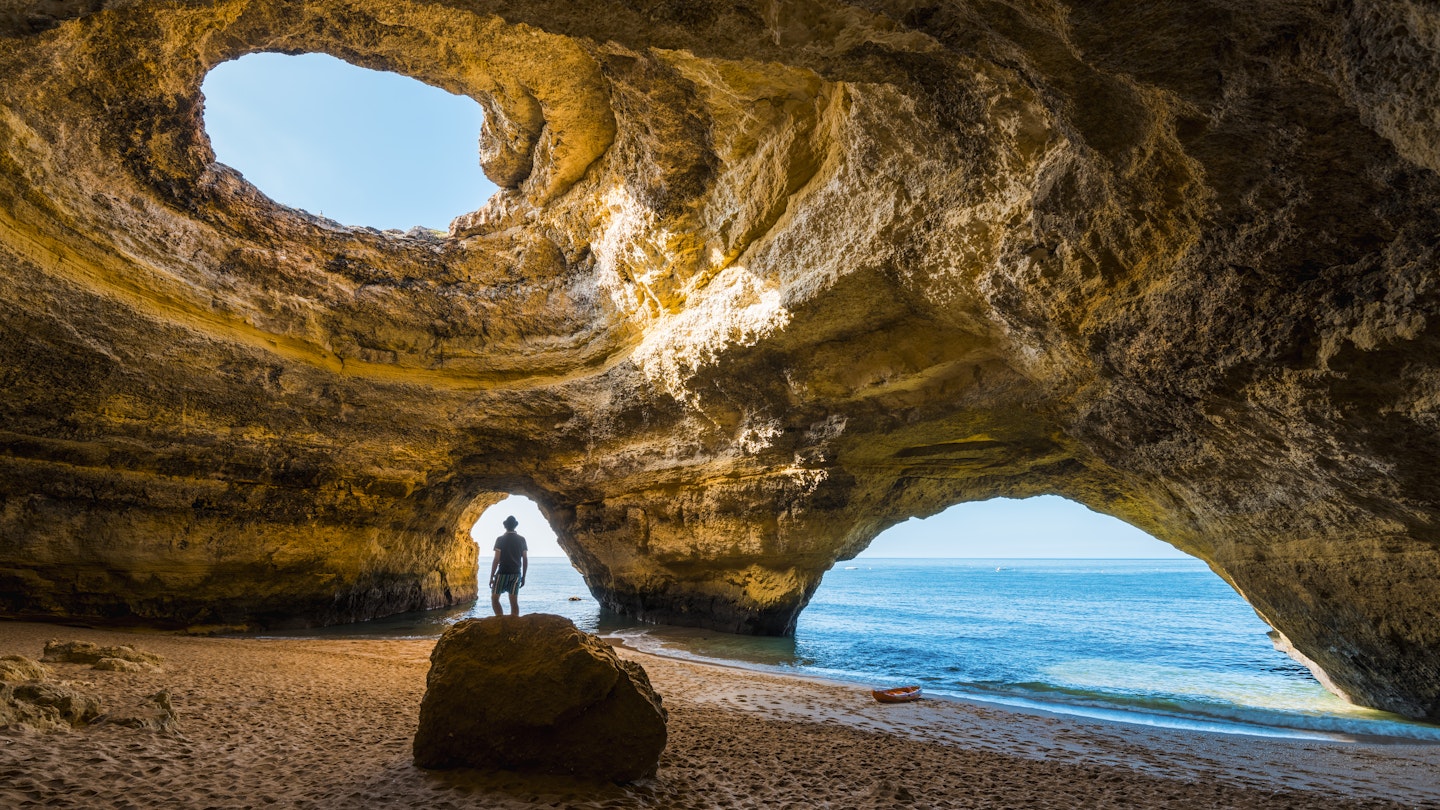Essential Travel Tips for the Algarve, Portugal
Anchoring the south of Portugal, the Algarve is famous for its cliff-backed beaches, mouthwatering seafood, and picturesque villages. Additionally, it boasts a remarkably easy-going atmosphere that welcomes every type of traveler.
While it’s easy to hop on a plane for a spontaneous week or weekend getaway, it’s beneficial to learn a few cultural tidbits before your arrival. Make the most of your visit to the Algarve, whether you’re a first-time traveler or returning for another adventure, with these top tips on planning, packing, and enjoying your stay.
1. Decide Where to Stay
The Algarve has many facets; thus, your lodging choice should reflect how you plan to spend your days in this sun-drenched corner of Portugal. For aquatic activities and abundant nightlife, vibrant Lagos earns high marks for its wide-ranging appeal. If you’re here solely to party and relax on the beach, Albufeira is a great choice. For a quieter escape near charming beaches, consider Ferragudo, a former fishing village rich in character.
Although not beachfront, the historic town of Tavira is just a ferry ride away from lovely sandy spots. Sagres, on the west coast, offers an end-of-the-world feel with lofty views from its towering sea cliffs. Additionally, the charming villages of Carrapateira are set on highlands overlooking wild beaches, featuring some excellent surf camps.
2. Book Accommodations in Advance
The Algarve’s rising popularity means some of the best accommodations book up months ahead, especially during the peak months of June through August. Therefore, once you have your itinerary organized, be sure to secure your lodging early.
3. Make Restaurant Reservations Early
Fresh seafood has long been a hallmark of the Algarve’s dining scene. With celebrated chefs opening new establishments, the region has transformed into a major dining destination. Today, the Algarve boasts five Michelin-starred restaurants, with two (Ocean and Vila Joya) earning two stars each.
To secure a reservation at top dining spots, it’s advisable to book at least a few weeks in advance. If you’re not planning on dining at Michelin-rated restaurants, aim to book a few days in advance or about seven days ahead for weekend reservations. Prime dining times typically run from 7 to 9 PM.
4. Consider Visiting Outside of Summer
If your goal is to avoid the busiest crowds, consider traveling just outside high season. In May and October, average daily high temperatures hover around 22 to 23°C (72 to 74°F), providing perfect beach weather. Nights can cool off, so it’s wise to have a jacket on hand as average lows fall between 12 to 15°C (54 to 60°F). Those willing to tolerate cooler temperatures will find abundant sunshine during the low season months of November through March, often benefiting from reduced lodging rates of 30% or more.
5. Embrace Green Travel Options
The Algarve features a train line connecting Lagos in the east to Vila Real de Santo António in the west, with essential stops at Portimão, Tunes, Faro, and Tavira. You can also travel by train from Lisbon. Additionally, the region offers an excellent bus service, Vamus Algarve, with numerous lines, including an Aerobus from Faro airport to major towns like Albufeira and Lagos. For a scenic route, consider the 52 EVA Cliffs Line that showcases breathtaking coastline views. Accessible ride-sharing apps like Uber can also facilitate your travels.
6. Pack for Diverse Weather
Pack beachwear, sandals, shorts, and summer dresses to fully enjoy the Algarve. However, note that things can cool off in the evening due to refreshing coastal breezes. Therefore, include a few warmer layers, even in July and August when average lows can dip to around 19°C (66°F). Although there are no formal dress codes at restaurants, locals often dress smart-casual in nicer establishments, so be prepared for that as well.
7. Learn Basic Portuguese
While many locals in Portugal, especially in tourist areas, speak English, they appreciate efforts to communicate in Portuguese. Consider using apps like Duolingo to pick up key phrases. A simple greeting like “bom dia” (good day) or “boa tarde” (good afternoon) when entering a business can make a positive impression.
8. Familiarize Yourself with Local Dining Customs
The Algarve features a wide array of dining options, including adegas (wine cellars), tascas (taverns), and familiar restaurantes (restaurants). Be sure to venture into the nearest pastelaria (pastry shop) to indulge in Portuguese delicacies; the pastel de nata (custard tart) is a must-try. Note that most eateries close between meals, typically from around 2:30 to 7 PM. Sundays can also be tricky, as many establishments close entirely or open only during lunchtime. To avoid disappointment, keep some snacks on hand from local markets.
9. Understand Appetizer Costs
Another key culinary tip is to remember that appetizers, known as couvert, are not complimentary. These may include bread, cheese, and olives, and prices can vary significantly, sometimes ranging from €2 to €9 per person. If you prefer not to have them, a polite “no thanks” will suffice.
10. Stay Vigilant Against Pickpockets and Ocean Currents
The Algarve generally enjoys a reputation as a safe destination. However, be cautious of pickpocketing and bag snatching, especially in busy tourist areas. If renting a vehicle, avoid leaving valuables visible inside, and don’t leave belongings unattended on the beach.
Additionally, be mindful of ocean currents, which can be strong and unpredictable. Opt for beaches with lifeguards and heed warning flags: green indicates safe swimming, yellow suggests caution, and red means no entry.

This article was first published Jun 18, 2022, and updated Mar 3, 2024.




